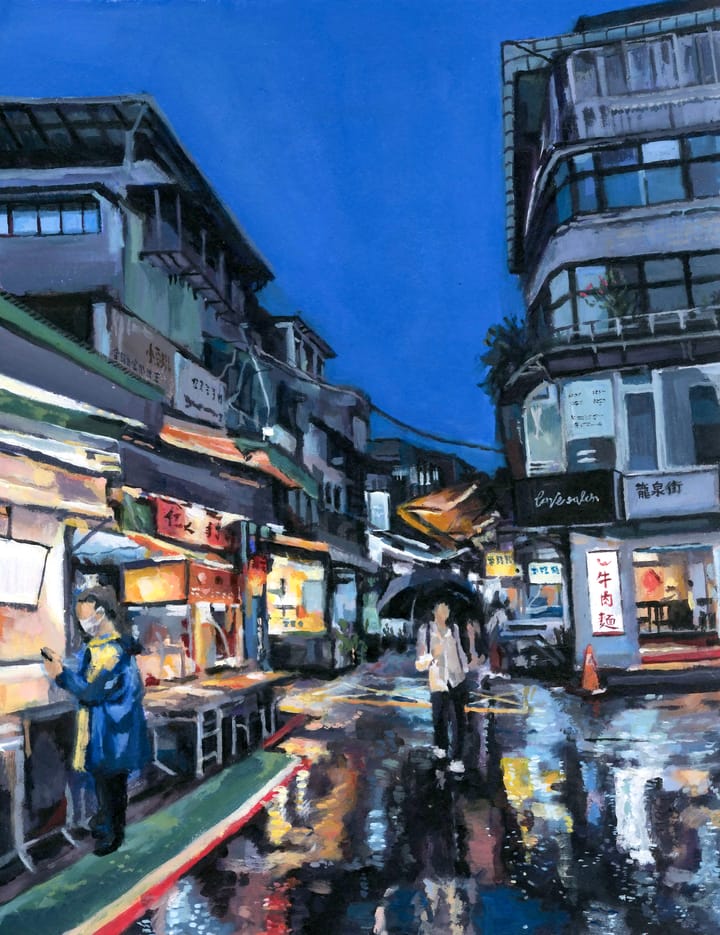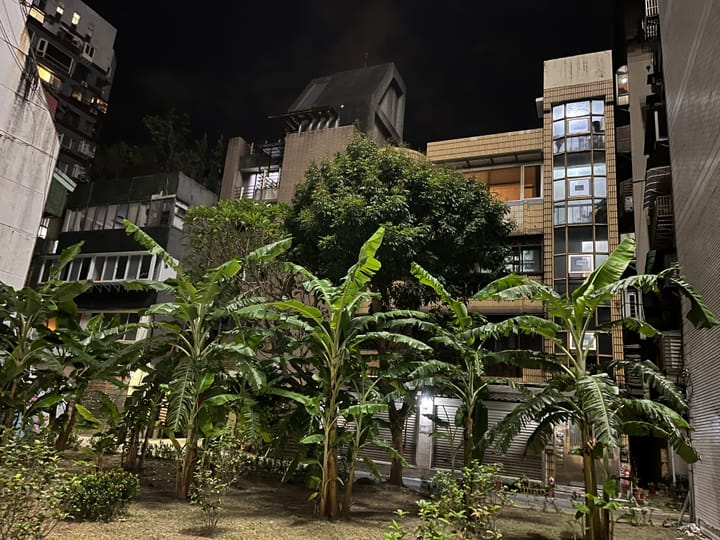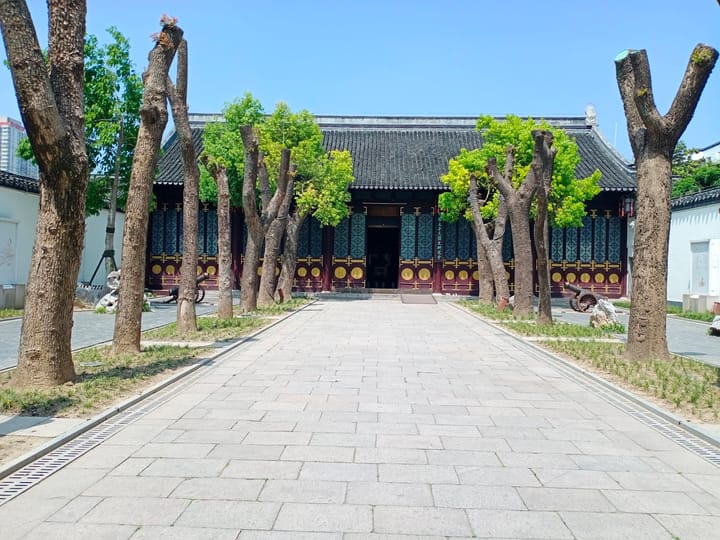#1 We're All From Somewhere
This newsletter will hopefully be many things—a diary of my time in Taiwan, a place for musings about Taiwan’s politics and culture, and a record of the amazing and often amazingly difficult experience of learning Chinese.

“Where are you from?”
It is one of the first questions someone asks you when visiting a new place. This summer, while I was in Taiwan for two months, new acquaintances would almost always assume the answer. “Ni shi Meiguo ren ma?” (Are you American?)
I am American to the core—in my accent, my interests (American football, superhero movies, terrible cooking shows), and my perspective on the world. But these Taiwan interlocutors often find it odd when I strain to specify that my hometown is Feicheng (Philadelphia), a city they know for its unruly sports fans if they know it at all.
Why do I insist on affirming this aspect of my identity? Home means different things to different people. To some, it evokes painful memories, a past life best left in the shadows. To me, it always signifies family. No matter how far away I go, these are the people who will welcome me back to a house where spaghetti is on the table and the Phillies are on TV.
Shortly after returning from Taiwan, I posted a picture of the Philadelphia skyline on Instagram. My friend Aynur responded, dryly: “Best city in Dan’s universe.” She’s right, perhaps never more so than now. In a little under a week, I head back to Taiwan. After completing a summer language program in Hsinchu, a city on Taiwan's western coast, I'll soon be in Taipei to spend nine months studying Mandarin Chinese at the International Chinese Language Program. During this time, I’ll be on a leave of absence from Georgetown University, where I’m pursuing a master’s degree in Asian Studies with an aim toward a Ph.D to study Chinese ethnic policy.
This newsletter will hopefully be many things—a diary of my time in Taiwan, a place for musings about Taiwan’s politics and culture, and a record of the amazing and often amazingly difficult experience of learning Chinese—but more than anything, I hope it reflects that connection to “home” during a time where I’ve never felt farther from it.
So yes, expect some commentary on the Phillies and Eagles. (As for the professional basketball team, I’m happy to leave them in Philly.)
Odds and Ends:
I’ve spent the past few months fact checking New York Times reporter Edward Wong’s book, At the Edge of Empire: A Personal History of China’s Rise, which is a terrific account of his father’s experience coming of age in 20th-century China told in parallel with Ed’s recent journalism. I particularly enjoyed Ed’s reporting on Tibet, which sent me on a deep dive about the Sixth Dalai Lama, a remarkable figure whose love of poetry, wine, and women made him one of Tibetan Buddhism’s more colorful leaders.
My favorite tidbit about the Sixth Dalai Lama, which the Tibetan writer Tsewang Yishey Pemba notes in his book, White Crane, Lend Me Your Wings, concerns one of his best-known poems:
White Crane, lend me your wings
I do not go far
To Lithang
And then back
The Dalai Lama had fallen in love with a girl from Lithang, which is nearly 1,000 miles from his seat in Lhasa. To keep her from the supposedly celibate Tibetan leader, government officials had her exiled to Lithang, which the Dalai Lama longs for in his poem.
Years later, the Seventh Dalai Lama would reincarnate…in Lithang.
2.
Besides Edward’s book, one other book I’ve loved lately is Waiting to Be Arrested at Night: A Uyghur Poet's Memoir of China's Genocide by Tahir Hamut Izgil. Since China’s brutal crackdown on Uyghurs began in 2017, more than 1 million Uyghurs have been detained in their homeland in western China (known in Chinese as “Xinjiang.”) With reliable access to Xinjiang no longer a possibility, outside scholars and activists remain firmly in the debt of exiles like Izgil, whose heartrending book is a vital, historical account of the day-to-day impact of China’s policy of forced assimilation and ethnic cleansing. I was particularly moved by the more quotidian details of his book, which show the near-comical extent of the Chinese Communist Party’s effort to eradicate Uyghur customs and culture. One example: all butcher shops and restaurants in Ürümqi, the Xinjiang capital, had to chain their knives and other cutlery to the wall to prevent their use by “violent terrorists.”
3.
This week marks the release of the annual Georgetown Journal of Asian Affairs, which is the scholarly publication put out by my graduate program. (Though my title is "senior editor," my contributions mainly consisted of a lot of "good job, guys!" and a few reminders about proper usage and style.) What I really love about this issue is its emphasis on highlighting perspectives from scholars that go beyond the traditional U.S. or Chinese paradigm of viewing the region. This idea stems from our editor-in-chief Jada Fraser, herself a scholar of regional alliance patterns, and comes through in articles that look at security policy in Bhutan, India, Malaysia, the Pacific Islands, and elsewhere. I'm most proud of the way our editorial team handled several interviews with Asian policymakers, including Indian diplomat Vijay Gokhale, Singaporean official Bilahari Kausikan, and Malaysian politician Liew Chin Tong. You will want to read these!
4.
What music I’m listening to:
- “Wicker Woman” by the incredible Matt Coakley, a Chicago singer-songwriter with an omnivorous musical taste. I’d listen to any of Matt’s music because he’s my friend, but what hooked me with this song was its indelible opening line and that groovy beat, which builds and builds.
- Some classic Southern tunes, which my Philly brain took this long to finally come around to: “He Stopped Loving Her Today” by George Jones; “The Pain of Loving You” by Dolly Parton and Porter Wagoner; and “Deep Water” by George Strait. Then there’s the very strange and very earwormy “Poor Old Dirt Farmer” by Levon Helm, which my roommate William played this summer and soon became our apartment’s unofficial anthem.
- Some Chinese music, of course! 煙花 (“Yan Hua”) by Leah Dou and 我的新衣 (“Wo de xin yi”) by Chinese rapper Vava have been stuck in my head for a while. I’ve also gotten really into the Taiwanese band 冰球 (“Bing Qiu,” which translates to “Icyball”) after a recommendation from my friend Robin. Their song, 能不能和我留在台北 (“Neng bu neng he wo liuzai Taibei” → “Will you stay with me in Taipei?”) is a marvelous love song and gets brownie points from me for being about Taipei.
Chinese Learning Corner
There is an ungodly amount of Chinese learning material online, much of which feel superfluous when you’re learning the language full-time in a classroom every day, but two resources I’ve enjoyed recently are:
- Grace Guo on YouTube (“Grace Mandarin Chinese”): I really like her channel’s mix of 1) informative videos on regional accents and how to parse “fast” Chinese and 2) less serious content, like one video where she critiqued Mark Zuckerberg’s Chinese. Each video is a reasonable 10-12 minutes too, which makes it a perfect way to 杀时间 (“kill time”).
- Oh, China!: An Elementary Reader of Modern Chinese for Advanced Beginners by Chih-p'ing Chou, Perry Link, and Xuedong Wang is a textbook for heritage speakers, but after working through a few chapters of it, I was really impressed by its explanation of Chinese grammar, particularly its explanation of when to use the neutral tone.
If you made it this far, thanks so much for reading! Expect to see me in your inbox twice a month. And please stay in touch—I'm at dspin3@gmail.com—and let me know if there are any aspects of Taiwanese culture or society that you’d like me to write about. Don’t worry, you won’t have to wait long for food pics.


